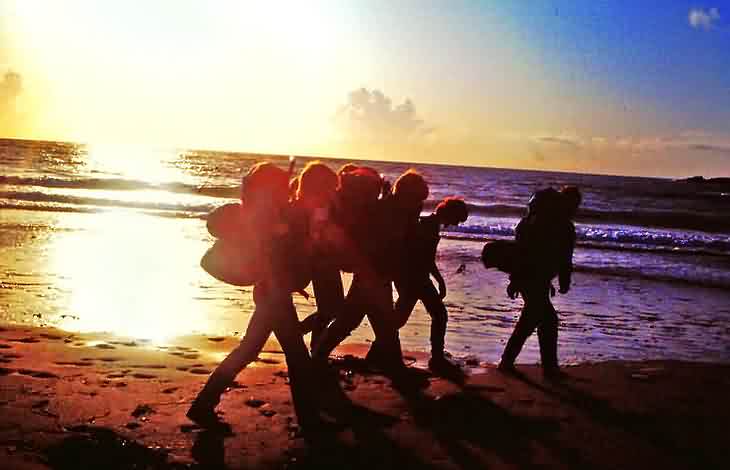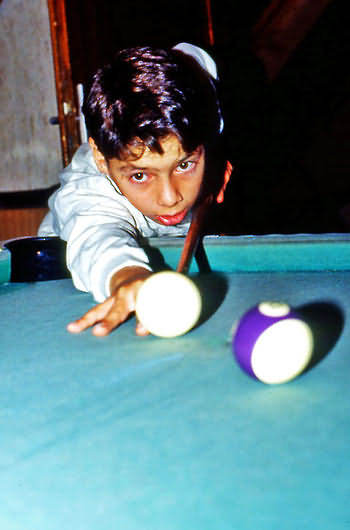source: www.youthwork-practice.com | 2000 Games, Devotions, Themes, Ideas and more for Youth Work
only for private using
Development of cognitive abilities during adolescence
Unlike most animals, humans have so-called cognitive abilities. This means, our ability to think and all other abilities that are connected to it. For example, cognitive skills include the ability to learn from mistakes, avoid making mistakes or eliminate existing errors. It also means the ability to focus on desired things. And, of course, memory plays a crucial role when it comes to the molding of cognitive abilities.

Although these cognitive abilities are innate, and its development begins in the early childhood,
however, during the stage of adolescence they imprint - especially during puberty.
©: klickerminth - Fotolia
Although these cognitive abilities are innate, and their development begins already in the early childhood, imprinting they do in the stage of adolescence. – Particularly during puberty they develop and evolve rapidly.
However, cognitive skills are already observed in infants. They support the baby’s motor skills. For example, they can recognize objects or linguistic formulations. In the early childhood, their memory is sufficiently developed so that the child can recognize correlations and reproduce the experience. The long-term memory is relatively weak in infants. This develops only between the sixth and twelfth month. After all, the strategic behavior depends on the long-term memory, which then becomes more apparent.

Developement of cognitive abilities in the childhood | ©: pio3 - Fotolia
The role of parents in the development of cognitive abilities during childhood
Particular in kindergarten and pre-school age, the parents play an important role in the development of intellectual abilities of the child. This is mainly because children at this age have only a very limited, constructive memory. Therefore, the parents are important as role models. This applies for example for the linguistic memory. It can be observed that children in kindergarten and pre-school age very much take on the parent’s linguistic example. Between the 5th and 15th year, the young people experience an incredible boost of their cognitive abilities. The linguistic memory develops further and its capacity increases multiply. This is important because by experience the wealth of knowledge of the child in this particular age range increases considerably. Therefore, the child requires a certain capacity to store this knowledge permanently.
The development of cognitive abilities during adolescence
The Latin word “adolescent” is called adolescence based on the meaning "to grow up". It refers to the entire period between late childhood and early adulthood. To simplify the whole process, we commonly use the term puberty, which is more frequently used in the Western world.
As part of the physical changes of boys and girls during puberty, their behavior changes as well. Gradually the child develops an own identity and personality. Usually, this does not come without problems. In particular with themselves and their environment. At the end of this process is the entrance into adulthood. This occurrence is very much depending on the characteristic of personal development and cognitive behavior and, therefore, cannot precisely pinpoint a particular time or age. It’s only the law that has a precise date: The completion of year 18. From there on a person is considered to be an adult. However, by now it is evident, that the young person by the age of 18 by no means is an adult. This process ends earliest with 25, sometimes even later.
The increased cognitive abilities during puberty become obvious as the young person’s thinking becomes more systematic. He considers several possible answers to any given problem. Based on these possibilities, the solution to the problem can now be tackled. Those cognitive skills are not seen in a child before puberty or in the early stages of puberty. This happens as a rule of the thumb between 11 and 14 years.
Logic and abstract thinking
The ability to think abstractly and take logical actions, develop greatly during puberty. Young people from age 14 and up observe every day correlations differently and can judge them accordingly. Younger children, on the other hand, take reality as it is and deal with it accordingly. The youth will question reality and ask how this reality could play out under different circumstances. We call this ability formal operational thinking - one of the most important indications of the approaching adulthood.
Improving the ability to concentrate
An important cognitive ability is a concentration. While younger children pay particular attention to that to which they are pointed as well as what appears to them worthy of attention. During puberty, young people develop the capacity to focus on things or situations that initially are not considered worthy of their attention.

Learning and understanding | ©: goodluz - Fotolia
In this context, the speed of information processing increases significantly. This is especially true in the area of personal specialized knowledge, which also increases at the stage of puberty. This refers to an area or areas in which the individual has a greater interest as others in his environment. In these areas, the processing speed of information is particularly high. The youngsters developed effective strategies to categorize and, therefore, optimize their knowledge.
Conclusion: given the cognitive abilities it is possible to understand the history of adolescence quite well
Hardly any other course of development gives as precise a conclusion about the developing young person then their cognitive abilities. However, once again, adolescence can further be divided into several different phases. To each of those phases, a cognitive skill is assigned to which development takes on priority.
In general it can be said: The cognitive skills are one of the key differentiators between humans and other beings . During adolescence, the young person develops what we generally call intelligence. Intelligence includes things like automatically finding different solutions to a problem and then figure out, which one is the best at any given situation. However, that's not all. Also, the speed and the way information is processed, is part of human cognitive abilities. During adolescence, the person develops the ability to pre-filter information and categorize so that it can rapidly be absorbed and stored as sensibly as possible.

Hiking with Youth | ©: www.youthwork-practice.com
Games and ideas to support cognitive skills in youth work
Children’s and youth groups give excellent opportunities to practice these cognitive skills in interaction with others, to develop further and practice social behavior and cooperation.

Billiard competition | ©: www.youthwork-practice.com
Please feel free to browse our collection of games and programs. You will find that we are covering various topics. There are creative games, problem-solving games, quizzes, logic games, strategy games and role-playing games.
What’s the difference between the youth group and home? If the child has already learned some cognitive skill, then children’s and youth groups offer the possibility to deepen those skills as well as develop new ones. Particularly in the social field. A child that never attended to children’s or youth groups and therefore never has learned to fit in is likely to have difficulties later on in life with colleagues. Thoughtfulness, cooperation, self-confidence - in short, social interactions, which can be learned only in social settings.
[ © www.youthwork-practice.com | 2000 Games and Ideas for Youth Work ]






